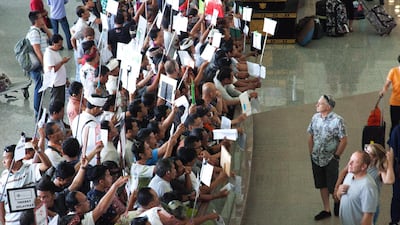Berlin ride-booking company Talixo is looking to "at least double" its total fundraising to date with an eye toward expanding operations in the UAE and Saudi Arabia, as Careem’s acquisition by Uber in March piqued the interest of investors to opportunities in the region's mobility industry.
Earlier this year, Dubai broke into Talixo's top 20 by the number of rides booked via its software and revenue - which caught the founder's attention.
"The Middle East has not been overlooked, that's the wrong word, it's now growing so fast that it's on the radar," Sebastian Kleinau, chief executive and founder of Talixo, said in an interview with The National.
With more than 100,000 app-based vehicles for hire cruising around San Francisco and New York on any given day - nearly half unoccupied, according to a study by the New School and University of California - Talixo is aiming to reduce idle time and increase revenue for transport companies.
He is in talks with venture capital funds and family offices in the UAE, as well as Europe and the US, to "at least double" funding from the $12.27 million raised to date with existing investors such as private equity firm TA Capital, Germany-owned railway company Deutsche Bahn and Swiss engineering firm Ammann Group.
"With Careem's acquisition, there are more opportunities to leverage [in the Middle East]," Mr Kleinau said.
Tourism and business travel bookings through Talixo are on the rise in the GCC, and the company is aiming to increase its customer base tenfold in the UAE in the next year, from 300 cars currently.
Mr Kleinau said he is also eyeing opportunities in hilal tourism and Makkah, in Saudi Arabia, where travel booking is outdated and there is little coordination among transportation companies.
Unlike typical ride-sharing or hailing apps, Talixo does not rely on freelance drivers or operate its own fleet. Instead, it provides a booking management software to private car and taxi companies to help optimise routes and drivers.
Talixo's first client in Berlin in 2012 had 10 limousines and 20 drivers, "basically working with Windows Excel sheets and printouts of faxes", Mr Kleinau recalled, with digitalising operations for an old-fashioned industry the company's mission ever since.
Talixo's fixed-rate "budget" offering is cheaper than a taxi and "the driver is still happy because he gets more money at the end of the day" from a scheduling system that assigns rides based on the most efficient routes, Mr Kleinau said.
While perhaps less trendy than ride-hailing, Talixo has inked exclusive deals with TripAdvisor, Expedia, airlines and Fortune 500 companies to link its database to riders and car companies using its software in over 1,000 cities.
Talixo is not investing any money in other driving logistics-type businesses such as last-mile or food delivery, unlike its peers. Careem late last year poured $150 million into Careem Now, its delivery unit.
Autonomous vehicles are also off Mr Kleinau's radar. Uber raised a fresh $1 billion for its driverless cars business last month, valuing its autonomous driving unit at $7.25bn, the company said at the time.
"We're leaving that to the other guys," Mr Kleinau said. "My developers are ready to get our technology to immediately be able to 'talk' to driverless vehicles”.
When the time comes, it will be easy to take a driver out of the equation, he said. But, for now, he does not see that happening anytime soon.


